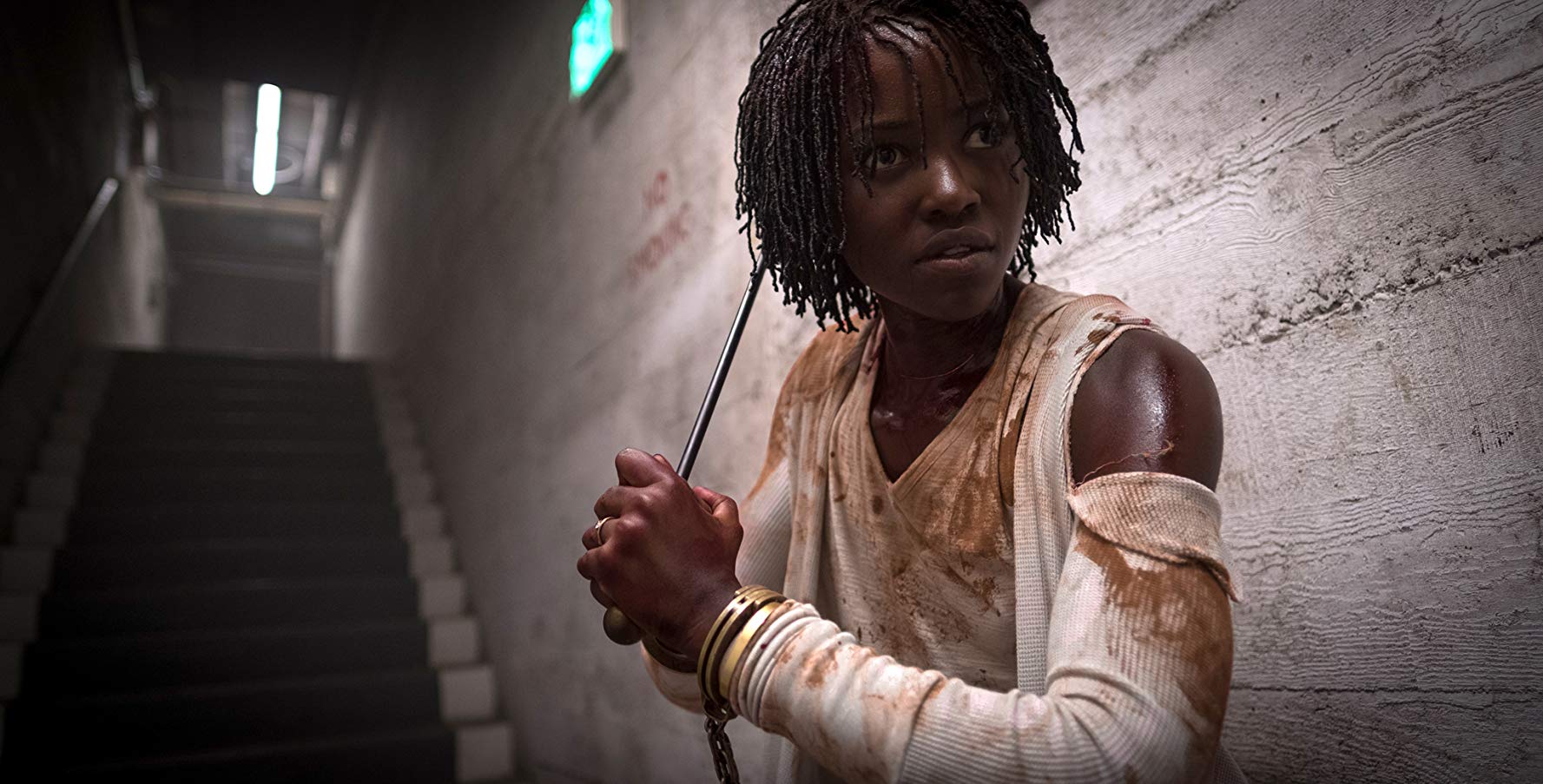
MPAA Rating: R | Rating: ★★½
Release year: 2019
Genre: Comedy, Horror, Thriller Director: Jordan Peele
Us, Jordan Peele’s follow up to his excellent Oscar-winning debut Get Out, is a go-for-broke ambitious mess of a film. I found myself thinking Peele’s two films are akin to Ridley Scott’s Alien and Prometheus; the former is a fresh, thematically-rich and chilling horror film with a simple-yet-terrifying premise (both Get Out and Alien are riffs on the haunted house trope) while the latter is just batshit crazy in the best possible way. It’s as if Peele had a big brainstorming session with a smorgasbord of ideas, then decided to include every single one of them in Us.
Us opens with a traumatic childhood event for Adelaide Wilson (Lupita Nyong’o): in 1986, on the Santa Cruz beachfront, she wandered away from her parents for 15 minutes into an abandoned house of mirrors and saw a girl that looked exactly like her. Fast forward to a few decades later, and the adult Adelaide is headed to Santa Cruz again, this time with her husband Gabe (Winston Duke) and her two children, Zora (Shahadi Wright Joseph) and Jason (Evan Alex). A typical upper-class suburban family, they head to their beach house to relax and unwind. They meet up with their uppity wealthy friends, Kitty (Elisabeth Moss) and Josh (Tim Heidecker) and their twin teenage daughters, Becca and Lindsey (Cali and Noelle Sheldon). When Jason briefly disappears at the beach–coincidentally in the same carnival house of mirrors from Adelaide’s past–and witnesses a strange figure standing with arms outstretched on the sand, it leaves Adelaide deeply unsettled.
When darkness falls, Us turns into a home invasion film with a twist: the four red-jumpsuit-clad invaders standing out on the driveway are exact doppelgängers of the Wilson family. Let by the mother, Red (also played by Nyong’o), the new family’s movements and demeanor are decidedly off and creepy; their stiff-yet-swift movements, unblinking stares, and deadly sharp golden scissors are all quite intimidating. When the two families are finally face to face, Gabe asks the question on everyone’s mind: “Who are you people?” To which Red calmly responds: “We’re Americans.”
Now, in my UK theatre, this line elicited a huge uproar of laughter. Indeed, Us is darkly hilarious, a genuine comedy as much as a horror film, and I laughed quite a bit throughout the final half. Though gruesomely violent at times, Us is not particularly scary, mostly due to the pacing and shot placement. Peele chooses to show us quite a bit of Red and her family (as well as other, future invaders), opting for an unsettled feeling rather than jump scares or outright dread and terror. If you simply accept its ridiculous premise and allow the jokes to set the tone, Us is quite a bit of wacky horrific fun.
Metaphors work well when they’re simple. This is not to say that there is a one-to-one correspondence of meaning, a This=That formula–true metaphors can elicit a polyvalence of legitimate interpretations and ideas–but rather that the symbol or sign doesn’t require huge explantations to discern its meaning and significance. This is especially true for horror; keep it simple, smart, and scary, and the symbolism will work wonders. This is precisely why Get Out worked so well: the Sunken Place was about white supremacy and racism, sure, but it was also about so much more than that–capitalism, classism, modern aesthetics, sexuality and gender, police and security, even social media. It kept us talking about the problems in our nation, the things that make us uncomfortable or angry, the beliefs and systems which are both ubiquitous and oppressive. Us gets us talking about how and why the doppelgängers eat bunnies.
Which is fine. Horror films–or any films for that matter–don’t have to be philosophically rigorous or culturally stimulating to be good art or entertainment. The problem is that Us wants to tease us with all its supposed symbolism, to provoke us to ask why? even as the film doesn’t really care about offering a coherent answer or making a sensible statement on The Way Things Are. Us is about capitalism, politics, ideology, racism, classism, sexism, religion, bunnies, California, boating, bunnies, Black Flag, still more bunnies, the “Hands Across America” event of 1986, the weird culture of beachfront theme parks, Michael Jackson’s Thriller, Cartesian dualism, the fashion faux pas of wearing Crocs, and the peril of running with scissors.
It’s also about the Bible. A grungy drifter carrying a cardboard sign with “Jeremiah 11:11” is a repeated image, albeit it’s difficult to discern how this is important to the events in the narrative (though I imagine it’ll make folks look up the verse after the film). In a climactic, balletic confrontation between Adelaide and Red–a beautiful sequence where image, sound, and performances all come together in cinematic perfection, a moment which is perhaps one of my favorite scenes I’ve ever seen in a horror film–the doppelgänger tells her twin in a De Palma-esque split diopter shot that it was God who brought them together back in 1986. I don’t know what God has to do with any of this; I’m not sure Peele quite knows (or cares) either. The final “twist” is so obvious and such a cheat to the entire earlier narrative that it undermines any potential message or meaning Peele might be attempting to communicate. In short, Us (both the film and the nation) is kind of a big silly mess which makes little coherent sense, yet I feel a certain fondness for it. Maybe I can’t help it; I’m American.
IMDB Listing: https://www.imdb.com/title/tt6857112/
Leave a Reply